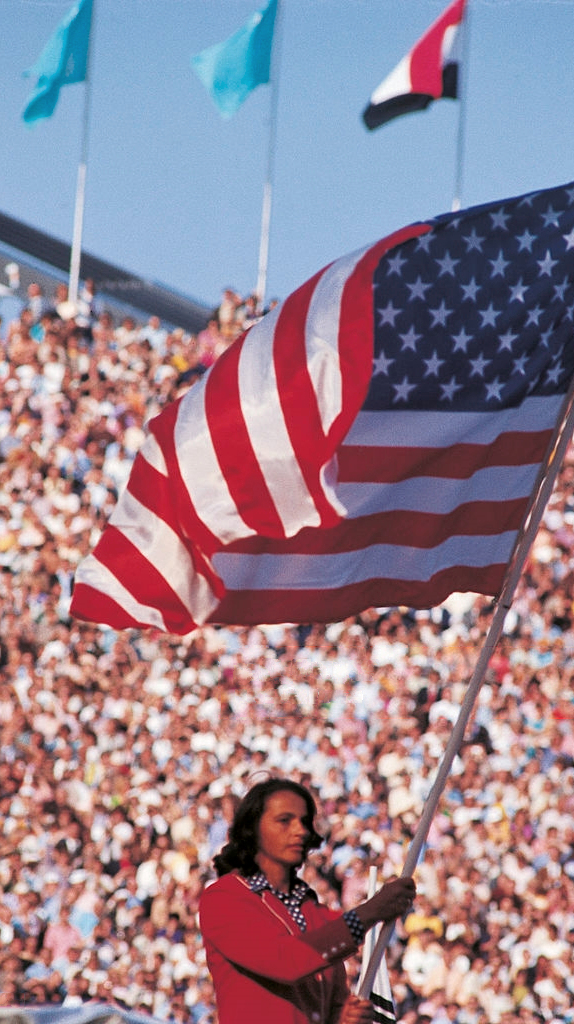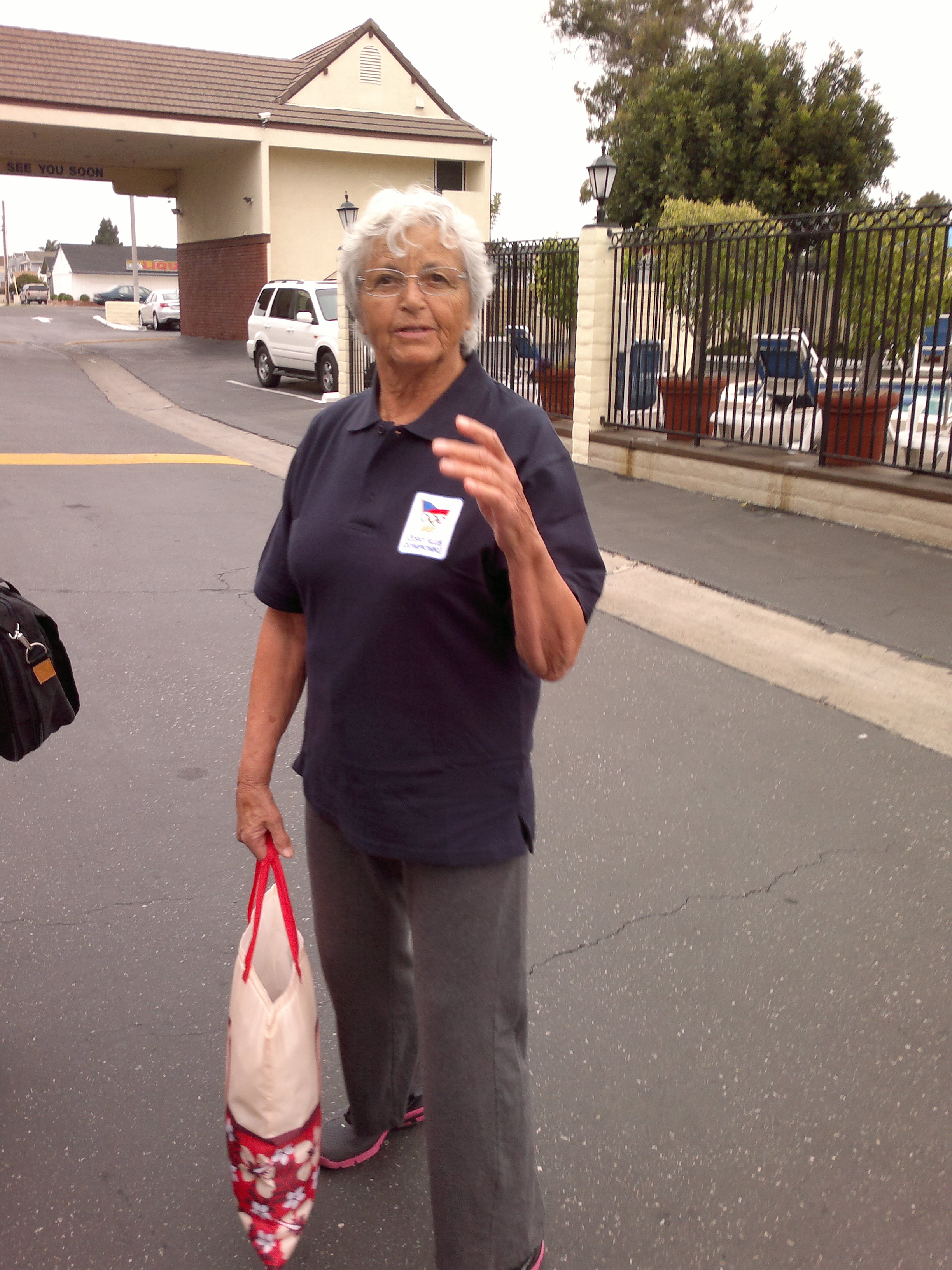1. Early Life and Athletic Beginnings
Olga Fikotová's foundational years and initial athletic pursuits laid the groundwork for her eventual success in discus throw, showcasing her inherent athleticism and rapid adaptability.
1.1. Birth and Education
Olga Fikotová was born on 13 November 1932, in Most, Czechoslovakia. She pursued her academic endeavors at Charles University in Prague, where she studied medicine. Her rigorous medical studies coincided with the early stages of her burgeoning athletic career.
1.2. Multi-sport Career and Transition to Discus
Fikotová was a natural athlete, initially representing Czechoslovakia in both basketball and handball. Her background in these dynamic, movement-oriented sports equipped her with excellent neuro-muscular coordination, which proved invaluable when she transitioned to discus throw in 1954. Her coach, Otakar Jandera, a venerable figure in athletics, recognized her athletic prowess, asserting that at her level, all she needed was to learn the technique and master the rhythm of the throw. Jandera's unique training method involved playing the "The Blue Danube" waltz on loudspeakers at the stadium, with Fikotová practicing turns to its rhythm. By the time she competed in the 1956 Olympic Games, she had accumulated seven years of intensive training across her various athletic pursuits since the age of 14, enabling her rapid development in discus.
2. 1956 Melbourne Olympics
The 1956 Melbourne Olympics marked a pivotal moment in Olga Fikotová's life, bringing her both significant athletic triumph and the unexpected beginning of a profound personal relationship.
2.1. Gold Medal Victory
At the age of 24, while still a medical student, Olga Fikotová competed for Czechoslovakia in the discus throw at the 1956 Summer Olympics in Melbourne. She achieved a gold medal with a throw of 176 ft (53.69 m), setting a new Olympic record. This victory was particularly significant as it made her Czechoslovakia's only gold medalist in athletics at the 1956 Games, surpassing Soviet competitors Irina Beglyakova (172 ft (52.54 m)) and Nina Ponomaryova (171 ft (52.02 m)).
2.2. Cold War Romance
During the Melbourne Games, Olga Fikotová met and fell in love with Harold Connolly, an American athlete who had won a gold medal in the hammer throw. Their romance blossomed despite coming from vastly different worlds, representing nations with seemingly incompatible political systems under the shadow of the Cold War. They found remarkable similarity in their basic human values and observations, communicating through Fikotová's fragmented English and Connolly's fragmented German. This connection quickly evolved from curiosity and friendship into a deep sense of love. The relationship was warmly received by the Western media and public, symbolizing hope and unity, though it was met with less enthusiasm by the Czechoslovak team officials, who viewed it with suspicion due to the prevailing geopolitical tensions.
3. Life in the United States
After her Olympic success and marriage, Olga Fikotová embarked on a new life in the United States, continuing her athletic career and later transitioning into professional wellness work.
3.1. Marriage and Emigration to the U.S.
Several months after the Melbourne Olympics, Harold Connolly traveled to Prague, where the couple planned to marry. Despite the political climate, Olga Fikotová was surprisingly granted permission to marry a foreigner. This approval was potentially influenced by the positive involvement of Czechoslovak President Antonín Zápotocký, who met with the couple just days before their wedding. Their marriage, held in October 1957 in Prague, drew immense public attention. Although they had intended a small, mid-week ceremony, news of the wedding spread rapidly, leading to an estimated 25,000 to 30,000 people gathering in Old Town Square to witness the event. Many came to see the legendary Czech Olympic gold medalists Emil Zátopek and Dana Zátopková, who served as their witnesses, while others were curious to see an American champion or simply came to show support for Fikotová. The occasion transformed into a festive public celebration. Following their wedding, the couple relocated to the United States. In June 1958, they appeared on the American game show To Tell the Truth, adding to their public profile.
3.2. Continued Olympic Career (1960-1972)
After moving to the United States, Olga Fikotová initially desired to continue representing Czechoslovakia in athletic competitions. However, the Czechoslovak Olympic Committee refused her request, further propagating a false narrative that she had declined to represent her home country. This misrepresentation led to years of ostracization from several of her former compatriots until the truth eventually came to light.
As Olga Connolly, she subsequently represented the United States in four consecutive Summer Olympics: the 1960 Rome Olympics, 1964 Tokyo Olympics, 1968 Mexico City Olympics, and 1972 Munich Olympics. This brought her total Olympic appearances to five, including her 1956 participation for Czechoslovakia. Although she did not win additional Olympic medals, she achieved notable placements, finishing 7th in 1960 and 6th in 1968. At the 1972 Munich Olympics, she was honored with the significant role of carrying the flag for the United States during the opening ceremony. Throughout her career in the U.S., she also achieved the distinction of becoming a five-time U.S. national champion in discus throw.

3.3. Post-Athletic Career and Authorship
In 1968, Fikotová published a book titled The Rings of Destiny, which chronicled her romance and marriage with Harold Connolly. After retiring from competitive sports, she transitioned into a professional career in wellness and fitness. She became a certified exercise therapist, specializing in holistic fitness studies and training methods. Fikotová instructed a wellness program at the University of California, Irvine until 2017. She then relocated to Nevada, where she continued her work as a fitness and wellness coach at the EoS Fitness Club in Las Vegas.

4. Personal Life
Olga Fikotová and Harold Connolly were married for 17 years before their divorce in 1975. They had four children together. Among their children, one son became a national-caliber javelin thrower and decathlete, while one of their daughters achieved recognition as a player on the U.S. national volleyball team.
5. Death
Olga Fikotová died from cancer on 12 April 2024, in Costa Mesa, California, at the age of 91.
6. Major Results and Personal Best
Olga Fikotová's athletic career was marked by consistent high-level performance across five Olympic Games and numerous national championships.
| Year | Competition | Location | Event | Result | Mark |
|---|---|---|---|---|---|
| 1956 | Olympic Games | Melbourne (Australia) | Discus throw | Gold | 176 ft (53.69 m) |
| 1960 | Olympic Games | Rome (Italy) | Discus throw | 7th | 167 ft (50.95 m) |
| 1964 | Olympic Games | Tokyo (Japan) | Discus throw | 12th | 169 ft (51.58 m) |
| 1968 | Olympic Games | Mexico City (Mexico) | Discus throw | 6th | 174 ft (52.96 m) |
| 1972 | Olympic Games | Munich (West Germany) | Discus throw | 16th | 169 ft (51.58 m) |
Her personal best in the discus throw was 189 ft (57.61 m), achieved in 1972.
7. Legacy and Impact
Olga Fikotová's life had a profound and lasting influence, extending beyond the realm of sports into significant cultural and political spheres.
7.1. Cultural and Political Significance
Olga Fikotová's romance and subsequent marriage to Harold Connolly became a powerful symbol that transcended the deeply entrenched political barriers of the Cold War. Their story, a testament to human connection overriding ideological divides, captured widespread attention, especially in the Western media, which largely celebrated it as an inspiring tale of love. In Czechoslovakia, while official entities like the Olympic Committee exhibited skepticism and later actively misrepresented Fikotová's desire to compete for her homeland after her marriage, the public's reaction was overwhelmingly positive. The massive turnout at their wedding in Prague's Old Town Square, which resembled a crowded festival, demonstrated a strong public support for the couple and their cross-border union. This event served as a rare moment of cultural exchange and a powerful, albeit unofficial, statement against the divisions of the era. Her subsequent ostracization by some former compatriots, due to the false narratives spread by the Czechoslovak authorities regarding her athletic allegiance, further highlighted the political complexities and human costs of the Cold War. Ultimately, her romance and its public reception became an enduring emblem of the possibility of unity and personal freedom even in times of global tension.
7.2. Athletic Legacy
Olga Fikotová's athletic legacy is marked by her singular achievement as Czechoslovakia's only gold medalist in athletics at the 1956 Melbourne Olympics. Her career further distinguished her as one of the few athletes to represent two different nations in the Olympic Games, participating in a total of five Summer Olympics (1956 for Czechoslovakia, and 1960, 1964, 1968, 1972 for the United States). The honor of carrying the U.S. flag at the 1972 Munich Olympics solidified her standing as a prominent figure in American athletics. Additionally, her five national championships in the discus throw in the United States underscore her sustained excellence and competitive spirit throughout her extensive career.